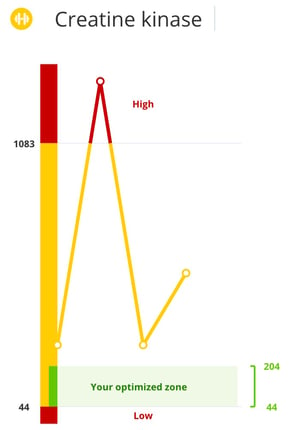![]()
If you’re an athlete, you know that in order to improve your physical performance, you have to work hard. But is the “no pain, no gain” mantra doing your body more harm than good? Here’s the tip that many world-class athletes use to increase their chances of success: getting an adequate amount of rest in between workouts can actually make you stronger!
What is overtraining?
Overtraining syndrome frequently occurs among athletes who are preparing for a certain race or competition. The misconception is that if you exercise intensely for long periods of time, your physical performance will improve. But without enough rest and recovery, such regimens can actually backfire and compromise your ability to perform well on the big day. Exercise breaks down your muscles, but rest helps to stimulate growth and repair. The combination of too much exercise with too little recovery time can result in overtraining syndrome.
What happens in the body when you overtrain?
If train hard, you probably have some sarcomeric damage, which just means that you’re straining your muscles and skeletal system. Marathon runners and weight-lifters put the greatest amount of stress on their muscular-skeletal system, and their bodies show evidence of the damage.
Creatine kinase (CK) is an enzyme that is located in several tissues in the body, mainly in muscle. When you are healthy and uninjured, there is a small amount of creatine kinase circulating in the blood, but when muscle damage occurs, the amount of CK in the blood can spike. Therefore, the CK in your blood can show the extent to which your muscles are over-exerted.
For example, a study shows that the CK levels of marathon runners are elevated after endurance training and competition. It takes about 7-14 days post-marathon for their levels of creatine kinase to return to baseline. There is a correlation between the pace of CK recovery and athletic performance: highly trained athletes will recover faster than untrained athletes. There is also correlation between CK level and injury; for instance, if you have high levels of CK and continue to exercise, you will increase your risk of injury, cramps, and fatigue.
What are some signs of overtraining?
A high level of CK in your blood is the clearest warning about overtraining. You can only determine the exact amounts of CK in your body with a blood test, such as the one that is provided by InsideTracker. Other signs include:
- Lethargy
- Mild leg soreness
- Muscle and joint pain
- Headaches
- Moodiness and irritability
- Decreased appetite
- Sudden drop in performance
- Compromised immune system, which results in an increased number of colds Increased number of injuries
What should I do if I show signs of overtraining?
If you suspect that you are experiencing overtraining syndrome, one of the first things that you should do is get your blood tested to determine if you have high levels of CK in your body. Most importantly, your body needs adequate time to rest and recover! Give yourself a few days to rest before you start your next workout and ensure that you stay hydrated.
The longer that you have overtrained, the more rest you need to recover. For instance, if you’ve been consistently overtraining for 3-4 weeks, you should take 3-5 days off. After your resting period, you can do workouts every other day until your symptoms have disappeared. You can maintain the same levels of intensity during your workouts, but decrease the total number of workouts.
How do I prevent overtraining syndrome?
To avoid overtraining, you have to take care of yourself. First, it’s very important to pay attention to your diet, especially your pre-workout meals and post-workout foods. Nutrition plays a huge role in your physical performance, and eating a wide variety of foods helps ensure that you have all the vitamins and minerals you need to optimize gains from exercise.
Second, be sure you allow yourself ample recovery time during training. The length of your recovery period depends on the intensity and duration of your exercise regimen, so be sure to listen to your body and adjust your training regimen accordingly. It’s better to rest too much now than suffer the consequences of overtraining later!
Lastly, cross-training is a great idea for athletes who suspect that they are over-working certain muscles and want to prevent injury. Engaging in a variety of activities helps to condition different muscle groups and allows you to vary the stress placed on specific parts of your body. For instance, if you’re a runner, try mixing up your training regimen with cycling, swimming, or rowing to improve your overall conditioning!
Most importantly, don’t let a fear of overtraining syndrome keep you from performing at your full potential! Just pay close attention to your body because you’re the best judge of how you are feeling. And choose an InsideTracker plan to get regular and accurate readings on your biomarker levels, especially creatine kinase. InsideTracker takes into consideration your age, gender, ethnicity, type of athletic activity (swimmers should have lower level of CK than soccer players) and determines your personalized range of CK. If you are too high, you'll get several personalized options for reducing CK levels, including dietary changes, exercises, and supplements.
Exercising regularly is one of the best things that you can do for your body, health, and emotional well-being, but if something doesn’t feel right…back off!
